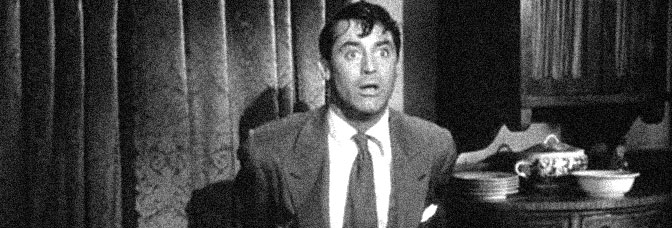Arsenic and Old Lace has to be one of the finest–if not the finest–film adaptations of a stage production. Nothing about the film, save the knowledge it’s from a play, suggests its theatrical origins… not the one night present action, not the one set. It’s an ideal motion picture comedy, down to what has to be Frank Capra’s most inventive direction. Capra’s confined to that one set for the majority of the film and he keeps things very interesting. He reveals the house gradually, not even exploring the full size of the main room–where around seventy percent of the story takes place–until well into the third act of the film.
The film’s full of fantastic performances, but the story’s split between Cary Grant and Raymond Massey. Grant disappears for a while and Massey takes over, but filling a completely different role than Grant. The film sort of goes without a protagonist for a while in Grant’s absence (Massey isn’t really an antagonist at this point) and the story accelerates into a different area without him. When he returns, he doesn’t inhabit the film in the same way. For the first half, watching Arsenic and Old Lace is watching Grant. Sure, lots of good stuff is going on around him, but his performance is captivating. It’s unlike anything else (Grant hated the performance) and it’s wonderful. Maybe because it so perfectly matches the viewer’s expectation of a reasonable person’s response to the film’s fantastic situation. The romance between Grant and Priscilla Lane–which has a lot of texture independent of the main action’s two plots (the aunts and their gentlemen and Massey’s return)–is wonderful too. Lane and Grant play great off each other; it’s impossible to imagine anyone else in the roles.
Massey has the film’s most difficult role, since it’s so incredible. I wonder how much Arsenic and Old Lace did for Boris Karloff’s name recognition, as Massey has to personify the idea of Karloff (and the unmentioned Frankenstein) from his first moment on film. But Massey has to go further–he has to be both menacing, dangerous and silly. The viewer has to be scared of Massey and what he might do, but also has to be able to laugh at him. By the time he’s ready to go after Grant, the viewer’s already had a chance to laugh at him a little, but Massey brings it all around to present real danger.
Peter Lorre has a similar position. He has to be funny–Lorre’s performance is one of film’s great comedic performances–but also endearing and a little disturbing. He’s still Massey’s partner in crime, even if he’s incredibly likable. There isn’t a weak performance in the film or even one less than stellar, but Lorre still stands out.
The rest of the supporting cast–Josephine Hull and Jean Adair as the two aunts are great–is all exceptional. Arsenic and Old Lace is one of those flawlessly casted films.
My wife had never seen the film before, which made the viewing even more entertaining. It’s least like the rest of Capra’s films of the period, but that dissimilarity somehow makes it more exciting to see from him. It’s as close to experimental as Capra ever got with his style. It might even be his most impressive work as a director; he’s essential to the film, which has such a strong script, it’s easy to think he could have gotten lost somewhere.
I’m hard pressed to identify my favorite part of the film. I love the sequences with Lane and Grant in the graveyard, but Grant’s long stretch of discovering what’s going on–where he’s the whole show–is fantastic too. But then there’s Lorre….
There’s just too many great things about Arsenic and Old Lace to narrow it down.
 ★★★★
★★★★
CREDITS
Produced and directed by Frank Capra; screenplay by Julius J. Epstein and Philip G. Epstein, based on the play by Joseph Kesselring; director of photography, Sol Polito; edited by Daniel Mandell; music by Max Steiner; released by Warner Bros.
Starring Cary Grant (Mortimer Brewster), Josephine Hull (Aunt Abby Brewster), Jean Adair (Aunt Martha Brewster), Raymond Massey (Jonathan Brewster), Peter Lorre (Dr. Herman Einstein), Priscilla Lane (Elaine Harper), John Alexander (Theodore Brewster), Jack Carson (Officer Patrick O’Hara), John Ridgely (Officer Saunders), Edward McNamara (Police Sgt. Brophy), James Gleason (Lt. Rooney), Grant Mitchell (Reverend Harper), Edward Everett Horton (Mr. Witherspoon), Vaughan Glaser (Judge Cullman), Chester Clute (Dr. Gilchrist), Edward McWade (Mr. Gibbs), Charles Lane (Reporter at Marriage License Office) and Garry Owen (Taxi Cab Driver).
RELATED

Leave a Reply